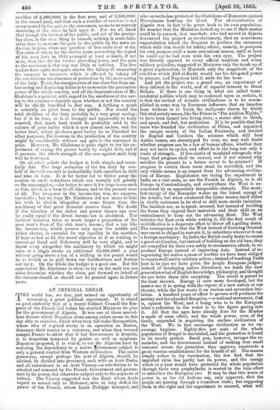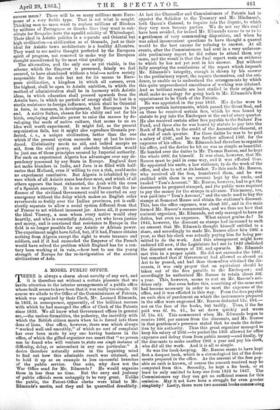AN IMPERIAL DREAM. T n. world has, we fear, just missed
an opportunity of witnessing a great political experiment. It is stated on good authority that at a recent Cabinet Council the Em- peror of the French laid before his startled Ministers his plan for the government of Algeria. It was one of those marvel- lous dreams which Napoleon alone among rulers seems in this day able to conceive, which when they fail make Bonapartists, whose idea of a grand stroke is an operation in Rentes, denounce their master as a visionary, and when they succeed compel France to allow that if her Government is despotic, it is despotism tempered by genius as well as epigrams. Napoleon proposed, it is stated, to cut the Algerian knot by restoring the dependency to a native Iovernment subject to only a general control from Western civilization. The entire possession, except perhaps the port of Algiers, should, he advised, be divided into provinces, each with an Arab Pasha, and all subordinate to an Arab Viceroy—a sub-Sultan to be selected and removed by the French Government and guaran- teed by its power, but otherwise subject only to the payment of tribute. The Viceroy suggested was the Emir whom Arabs regard as second only to Mehemet, who so long defied the power of the French, whom Louis Philippe betrayed, and who nevertheless protected the Christians of Damascus against Mussulmans howling for blood. The administration of Algeria was in fact to be given back to its own population. No wonder that the Ministers looked up to see if their master could be in earnest, that marshals who had served in Algeria denounced the project as revolutionary, that an unanimous expostulation forced the Emperor to perform the ceremony which with him stands for taking advice, namely, to postpone his own purpose until a more convenient season, until at least he could say he had seen with his own eyes. The project was directly opposed to every official tradition and every military prejudice, suggested to Ministers only the break-up of a great organization, to Marshals only the magnitude of the rebellion which Abd-el-Kadir would use his delegated power to prepare, and Napoleon laid it aside for the hour.
And yet the project was a grand one, an experiment of deep interest to the world, and of especial interest to Great Britain. If there is one thing in what are called trans- cendental polities which may be reckoned upon as certain, it is that the revival of Asiastic civilizations is to be acown- plished in some way by European influence, that an impetus from without is to break the malignant charm by which Oriental society seems, like the Prince in "The Arabian Nights," to have been turned into living stone, a statue able to think, and speak, and feel, but motionless. If it be possible thatthe races who founded the civilization of China, and organized the unique society of the Indian Peninsula, and studied in Bagdad and Cordova the sciences which still bear Arabic names, are stereotyped for ever, we may wall doubt whether progress can be a law of human affairs, whether they may not move in cycles, and effort be in the long run only a waste of strength. If five-sixths of mankind retrograde why hope that progress shall be eternal, and if not eternal why sacrifice the present to a future never to be attained ? If progress is certain these races must be revivified, and the only visible means is an impact from the advancing civiliza- tion of Europe. Englishmen are trying the experiment in India on a vast scale, so are the French in Algeria, so is all Europe in Constantinople, and everywhere the West is en- countered by an apparently insuperable obstacle. The mani- fest energy of the European wakes up the latent energy of the Asiatic, but when awakened the latter wastes itself either in sterile resistance to its rival or still more sterile imitation. The builders are, so to speak, aroused, but instead of building the house they expend their materials and their skill on an embankment to keep out the advancing flood. The West irritates the East even while waking it, till the first result of revivification is a desperate effort to throw off a galling chain. The consequence is that the West instead of fostering Oriental movement is obliged to restrain it, to substitute wherever it can a foreign machinery. In India the British really desire to create a great civilization, but instead of building on the old base, they are compelled for their own safety to recommence afresh, to re- produce Europe instead of improving Asia. Instead of re- organizing the native system of warfare we have been obliged to suppress all native military ardour ; instead of teaching Cadis how to be just we have given the people European judges ; instead of developing native literatures we teach the new generation what of English knowledge, philosophy, and thought we can bribe them into accepting. The result is patent to the least shrewd. Energy is once more developed, but the masses use it to spring with the vigour of a new nation at our throats, while the few waste it on useless and savourless imi- tation. A hundred years of effort to govern well produces the mutiny and the educated Bengalee,—a national movement, that is, against the West, and a being who is to the European what a reflection in the water is to the figure gazing into it. All that the ages have already done for the Hindoo is made of none effect, and the whole power, even of the docile, expended in acquiring the surface civilization of the West. We in fact encourage civilization as we en- courage hygiene. Eighty-five per cent. of the whole population of Bengal is inoculated, and the protection is found to be nearly perfect. Small pox, however, ravages the re- mainder, and the Government instead of making that small remnant secure the protection they approve, constructs a great vaccine establishment for the benefit of all. The masses simply refuse to try vaccination, the few find that the imported virus has partly lost its power, and the energy which in a year would have protected the whole population through their own prophylactic is wasted in the vain effort to introduce the European one. It may be that this waste of power is, as the old Indians say, only apparent, that the people are passing through a transition state; but supposing them in the right and the experiment to succeed, what will success mean.? There will be so many millions more Euro- peans of a very feeble type. That is not what is sought. Thinking men no more want to replace millions of Hindoos by millions of Portuguese or Greeks than they want to sub- stitute for Bengalee huts the squalid solidity of Whitechapel. Their ideal in Asiatic politics is a separate and Oriental but high civilization—a civilization as of Granada, just as their ideal for Asiatic town architecture is a healthy Alhambra. They want to see native thought perfected by the European spirit of progress, not removed to make way for European thought unenlivened by its most vital quality.
The alternative, and the only one as yet visible, is the scheme, which the Emperor is presumed, falsely we feel assured, to have abandoned without a trial—a native society responsible for its ends but not for its means to Euro- pean civilization, a kingdom in* which all careers, even the highest, shall be open to Asiatic ambition, in which the method of administration shall be in harmony with Asiatic ideas, in which education shall proceed upwards from the Asiatic base, in which no particle of energy shall be lost in a sterile resistance to foreign influence, which shall be Oriental in form, in manners, in development, but European in its end. A. native Sultan, chosen for his ability and not for his birth, employing absolute power to raise the masses by de- veloping the seeds of native culture, that seems to us an idea well worth experiment. It might fail, as the present organization fails, but it might also reproduce Granada per- fected, 1. e., a unique civilization, better than the one which if the present system succeeds may at last be intro- duced. Christianity needs no aid, and indOed accepts no aid, from the civil power, and absolute toleration would be just one of those principles secured by Imperial authority. For such an experiment Algeria has advantages over any de- pendency possessed by any State in Europe. England dare not make blunders in India, and Java is so filled with half- castes that Holland, even if willing to run a risk, could make no experiment conclusive. But Algeria is inhabited by the race which of all Asiatic races has done most, and which of all others appears the least exhausted, the Arab with the cross of a Spanish ancestry. It is so near to France that the in- fluence of the civilized Government could be exerted on any emergency without the delay which makes an English order reverberate so feebly over the Indian provinces, yet is suffi- tiently separate to allow a social system different from that of France to act without incessant jar. Above all, it possesses the ideal Viceroy, a man whom every native would obey heartily, and who is essentially Asiatic, yet who loves justice and mercy, and is convinced that resistance to Europe in the field is no longer possible for any Asiatic or African power. The experiment might have failed, but, if it had, France obtains nothing from Algeria except the right to waste treasure and soldiers, and if it had succeeded the Emperor of the French 'would have solved the problem which England has for a cen- tury been working at in vain,—how best to use the young strength of Europe for the re-invigoration of the ancient -civilizations of Asia.































 Previous page
Previous page